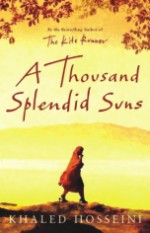|
Book Review
Women's Fates Entwine as Afghanistan Spirals into War
Julie Foster
 |
A Thousand Splendid Suns
By Khaled Hosseini
RIVERHEAD; 372 PAGES; $25.95 |
In 2006, Khaled Hosseini, author of "The Kite Runner" -- which has sold 8 million copies in 34 countries -- received the Humanitarian Award from the U.N. Refugee Agency, and was named a goodwill envoy for that agency. As a native of Afghanistan, a country with one of the world's largest refugee populations, Hosseini said he planned to "use his access to the media to give voice to victims of humanitarian crises and raise public awareness about matters relating to refugees."
With the publication of his second novel, "A Thousand Splendid Suns," Hosseini revisits Afghanistan for a compelling story that gives voice to the agonies and hopes of another group of innocents caught up in a war.
"The Kite Runner" is a father-son story written from a male point of view, but this time around Hosseini tells of the experiences of the thousands of silent burqa-clad women of Afghanistan. This mesmerizing narrative is a shining example of the awe experienced by Nancy Pearl, author of "More Book Lust," "when a male author can get inside a woman's head and write so persuasively, so authentically, that I find myself frequently turning to the back cover to see if it is, indeed, a man who wrote the book."
Told through the alternating voices of two women, the story spans the turbulent period from the 1970s to post-9/11. The multigenerational story is set mainly in the city of Kabul, Hosseini's birthplace. Afghanistan and its culture are as integral to the story as the relationship between the two women, Mariam and Laila, and their abusive husband, Rashid.
Readers will also gain a better understanding of the effects of what Hosseini calls the "cultural vandalism" of the Taliban, which shattered Afghanistan's arts and culture, and the devastating impacts of Shariah law on women's lives.
Mariam is the illegitimate daughter of a prosperous Herat businessman. Banished to a small hovel outside of town, Mariam and her mother live in impoverished seclusion. Mariam's father, Jalil, makes periodic visits bearing gifts and visions of a wider world. Mariam comes to idolize her father, though her mother warns repeatedly against trusting him.
Wanting desperately to be a part of his family, Mariam flees her mother and her desolate life at 15, traveling to her father's home in Herat. Disaster results, thrusting her onto a path of hardship she endures for the rest of her life.
After arriving at the family home in Herat, Mariam is rejected by her father and his family. Very quickly, she's forced to marry Rashid, a shoemaker from Kabul, a much older man, one she "smelled before she saw him." Though traumatized by the turn her life has taken, she attempts to acclimate herself to her life as a wife living in a new city.
Though the couple are poor, a new world of wonders that is Kabul of the 1970s opens for Mariam. She tastes ice cream for the first time. She glimpses what Rashid calls modern women, "their lips as red as tulips," wearing dark sunglasses, carrying swinging handbags, who "walked in high heels and quickly, as if on perpetually urgent business." For a time, the marriage seems to be taking hold, but soon enough Rashid's brutish nature emerges.
Parallel to Mariam's story is that of Laila. The beautiful, vivacious 14-year-old daughter of a schoolteacher father who dreams of going to California and a somewhat preoccupied mother, Laila lives a life filled with books, schooling and hope for the future. But as the war between the Pashtun and Hazaras forces ravages Kabul during the summer of 1992, Laila is thrown together with Mariam when a bomb blast ruptures both their lives.
"A Thousand Splendid Suns" is the painful and, at times violent, yet ultimately hopeful story of two women's inner lives. Hosseini's bewitching narrative captures the intimate details of life in a world where it's a struggle to survive, skillfully inserting this human story into the larger backdrop of recent history.
This review first appeared in the San Francisco Chronicle.
Copyright
(R) thedailystar.net 2007 |
